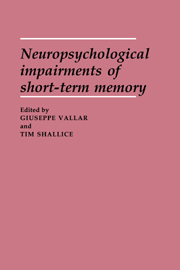Book contents
- Frontmatter
- Contents
- List of contributors
- Acknowledgments
- General introduction
- I THE FUNCTIONAL ARCHITECTURE OF AUDITORY–VERBAL (PHONOLOGICAL) SHORT-TERM MEMORY AND ITS NEURAL CORRELATES
- II PHONOLOGICAL SHORT-TERM MEMORY AND OTHER LEVELS OF INFORMATION PROCESSING: STUDIES IN BRAIN-DAMAGED PATIENTS WITH DEFECTIVE PHONOLOGICAL MEMORY
- 5 Auditory and lexical information sources in immediate recall: evidence from a patient with deficit to the phonological short-term store
- 6 Neuropsychological evidence for lexical involvement in short-term memory
- 7 Auditory–verbal span of apprehension: a phenomenon in search of a function?
- 8 Short-term retention without short-term memory
- III SHORT-TERM MEMORY STUDIES IN DIFFERENT POPULATIONS (CHILDREN, ELDERLY, AMNESICS) AND OF DIFFERENT SHORT-TERM MEMORY SYSTEMS
- IV PHONOLOGICAL SHORT-TERM MEMORY AND SENTENCE COMPREHENSION
- Name index
- Subject index
5 - Auditory and lexical information sources in immediate recall: evidence from a patient with deficit to the phonological short-term store
Published online by Cambridge University Press: 11 May 2010
- Frontmatter
- Contents
- List of contributors
- Acknowledgments
- General introduction
- I THE FUNCTIONAL ARCHITECTURE OF AUDITORY–VERBAL (PHONOLOGICAL) SHORT-TERM MEMORY AND ITS NEURAL CORRELATES
- II PHONOLOGICAL SHORT-TERM MEMORY AND OTHER LEVELS OF INFORMATION PROCESSING: STUDIES IN BRAIN-DAMAGED PATIENTS WITH DEFECTIVE PHONOLOGICAL MEMORY
- 5 Auditory and lexical information sources in immediate recall: evidence from a patient with deficit to the phonological short-term store
- 6 Neuropsychological evidence for lexical involvement in short-term memory
- 7 Auditory–verbal span of apprehension: a phenomenon in search of a function?
- 8 Short-term retention without short-term memory
- III SHORT-TERM MEMORY STUDIES IN DIFFERENT POPULATIONS (CHILDREN, ELDERLY, AMNESICS) AND OF DIFFERENT SHORT-TERM MEMORY SYSTEMS
- IV PHONOLOGICAL SHORT-TERM MEMORY AND SENTENCE COMPREHENSION
- Name index
- Subject index
Summary
Introduction
Many of the recent efforts to provide functional explanations for the deficits of patients with limited repetition span have used the theoretical framework available in the working memory model (Baddeley & Hitch, 1974; Baddeley, 1986). According to this formulation, a limited-capacity memory system composed of several distinct subcomponents is available for temporary storage of information that is needed for a variety of cognitive tasks. Recent modifications of the working memory model relevant to verbal tasks have postulated two separate components for the storage and maintenance of verbal information. An articulatory loop system, which provides for the subvocal rehearsal of verbal information in an articulatory code, has been supplemented in recent discussions by a more passive phonological short-term store, to which auditory–verbal information gains obligatory access. A variety of experimental results obtained with normal subjects necessitated the postulation of the nonarticulatory phonological short-term store (STS) (see Baddeley, 1983, for review). The most important of these for present purposes is the following: Prevention of subvocal articulation (which presumably blocks effective use of the articulatory loop) does not prevent the phonological similarity among to-be-remembered items from interfering with recall when stimuli are presented aurally. This “phonological similarity effect” is presumed to reflect phonological factors intrinsic to storage in some nonarticulatory component of the system.
Another finding with normal subjects supports the articulatory basis of the rehearsal loop. Longer words (those that take longer to articulate) are not recalled as well as shorter words, but this “word length effect” can be removed by the prevention of rehearsal through concurrent articulation.
- Type
- Chapter
- Information
- Neuropsychological Impairments of Short-Term Memory , pp. 115 - 144Publisher: Cambridge University PressPrint publication year: 1990
- 7
- Cited by

